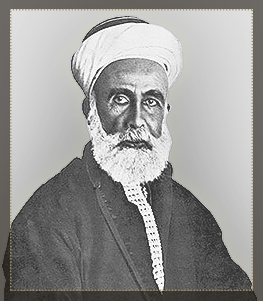
Sharif Hussein bin Ali
Sharif Hussein bin Ali was born in Istanbul in 1853, where his father and grandfather were staying at the time. His grandfather was then appointed as Emir of Hijaz, so he travelled with him to Mecca to studied. He also gained vast experience in his youth in the affairs of tribes.
Sharif “King” Hussein bin Ali’s children are princes — and later kings — Ali, Abdullah, and Faisal and Zeid.
After a new Hijaz Emir was appointed, the Ottoman influence and intervention increased, which raised the ire of Sharif Hussein and a number of community leaders. As a result, the Sultan summoned him to Istanbul and banished the other members of the opposition. Al Hussein stayed in Istanbul for 16 years. Although his stay was a form of banishment, the Sultan appointed him in the state’s shura council, until he was named Emir of Hijaz. As Emir, he limited the influence of governors and led campaigns to various areas to enforce the state’s authority. He also strived to implement a number of administrative and social reforms.
After the Committee of Union and Progress took over power in the Ottoman state, Arabs were subjugated, and Al Hussein exerted many efforts to contain the crisis by achieving the Arab demands for independence. He demanded that Syria, Iraq and Hijaz be given autonomy and called for pardoning political prisoners, but the Ottoman state refused. In response, Sharif Hussein bin Ali declared the Arab Revolt. Arab forces achieved major victories in World War I theatres that pushed the Allies to acknowledge Arabs as “a warrior nation”. Arabs were also present at the Paris Peace Conference, but the Allies did not keep their promises and the French invaded and occupied Syria.
In 1921, Britain attempted to reach an understanding with the Arabs, holding negotiations for a friendship accord with Sharif Hussein. However, Al Hussein refused the treaty because Britain insisted that he recognise the mandate over Palestine, which entails recognising a national homeland for Jews. In response, a conspiracy against Sharif Hussein led to his banishment to Cyprus.
Al Hussein bin Ali lived in exile until the end of 1930, when he returned to Amman and died in Raghadan Palace on 3 June 1931. He was buried in the square of Al Aqsa Mosque in Jerusalem.
Highlighted Statments
- I urge you to follow the approach set by the righteous Sharia in being kind to prisoners and refugees, safeguarding them, honouring them, ensuring their comfort and ensuring that no one harms them.
- Real citizenship is believing in this homeland and belonging to it regardless of roots, origins, or any other considerations.
- This Arab Awakening includes every Arab who is honest in belonging to his homeland and loyal to his people.
- There is no difference between an Arab Muslim and an Arab Christian.
- This Arab Awakening includes every Arab who is honest in belonging to his homeland and loyal to his people.

